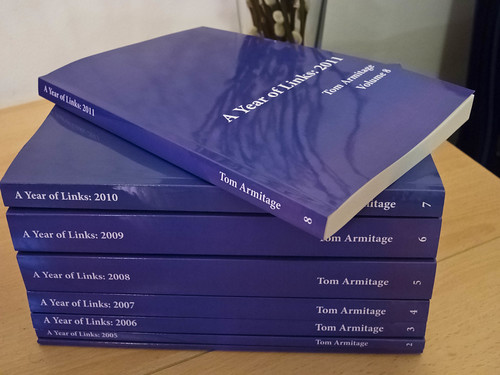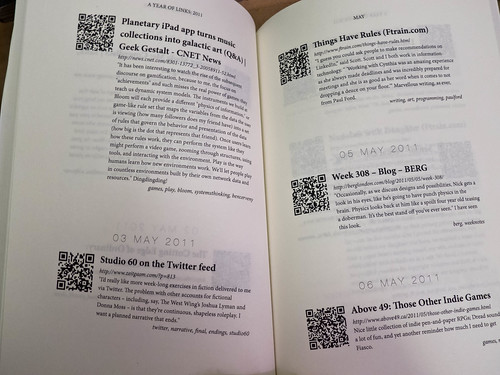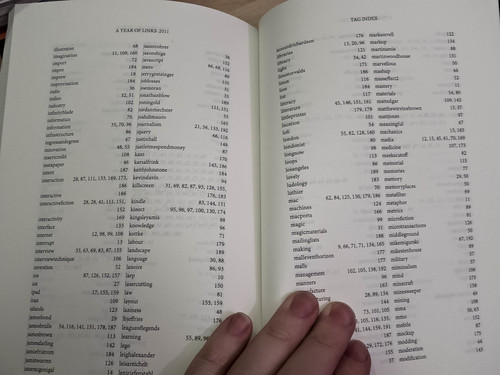-
"HyperCard effectively disappeared a decade a go, making way for supposedly bigger and better things. But in my mind, the end of HyperCard left a huge gap that desperately needs to be filled – a space for an easy to use, intuitive tool that will once again let average computer users make their own tools. Such a project would have huge benefits for all of us, wether we are artists, educators, entrepreneurs, or enthusiasts." Lovely piece by Jer Thorp on Hypercard. I've mentioned Hypercard is quite formative for me, right?
-
"Using the daily 0048 Shipping Forecast from BBC Radio 4, we take the average of each gale force mentioned for an area to determine that area's score. Pick a dream team of five sea areas, and your team's score will be the average of the scores of those regions, both daily and weekly." Hah, lovely.
-
"John Carter is the kind of movie no studio bigwig in their right mind ought ever to have greenlit: a space fantasy based on a genre – "planetary romance" – that hasn't been popular for well over half a century, populated by bizarre creatures from the mind of a writer apparently endowed with the ungrounded imagination of a small child. This is exactly why you should be checking it out. The film is out next weekend and I've posted the final trailer above. What a glorious enterprise Disney have wasted all their money on. God bless Hollywood!" I too am annoyed they lopped the suffix from the title. Otherwise, this has actually managed to spur interest in a film I'd written off.
-
"There is no silver bullet that’s going to fix that. No, we are going to have to use a lot of lead bullets." On knuckling down when faced with threats. (via Matt W)
-
"Finish Weekend helps you get it done. Come finish those projects you've put off to the side. Maybe you just need a bit of web help, a logo, or some code written. We'll help you finish." Heartily approve. I could do with a lot of these.
-
Gorgeous Moroccan restaurant in Paris. Pretty cheap, super-tasty. I am very full.
-
"You know, maybe aliens know all this, and we’re come-latelies to the whole comprehending-everything thing, but there isn’t really any more you can do in our current Universe than this. It’s the top thing. It is everything. This makes us amazing." James has basically said everything about our trip to CERN that is worth saying. This is all true. It was great and humbling. I'd also point out that every time you step out, you're under the Alps, and they're also phenomenal and humbling.
-
"There are several kinds of love. One is a selfish, mean, grasping, egotistical thing which uses love for self-importance. This is the ugly and crippling kind. The other is an outpouring of everything good in you—of kindness and consideration and respect—not only the social respect of manners but the greater respect which is recognition of another person as unique and valuable. The first kind can make you sick and small and weak but the second can release in you strength, and courage and goodness and even wisdom you didn’t know you had." John Steinbeck is wise, and a good father.
-
Network connected thermal printer. Bookmarked for future reference.
-
"Proteus, in the end, helps me move further into a design philosophy that avoids blacks and whites, finding a comfortable home in the much less solid greys. Videogames aren’t about mechanics. They aren’t about visual or audio either. They aren’t about the ideas of the author or about the experience of the player. They aren’t about story or actions or strategy. They aren’t about controllers or processors or screens. They aren’t about technology or culture or ritual.
Videogames are a combination of all these factors, or a combination of some of these factors. Videogames are whatever we want them to be. For Ed Key and David Kanaga, while making Proteus, videogames are about the beauty of walking, looking, and listening." However much I bang on about rules/systems/you know the score, I still very much agree with this. I still like the abstract.
A Year of Links
26 February 2012
I made a book.
Or rather, I made eight books.
If you’ve read this site for any particular length of time, you’ll be aware that I produce a lot of links. Jokes about my hobby being “collecting the entire internet” have been made by friends.
I thought it would be interesting to produce a kind of personal encylopedia: each volume cataloguing the links for a whole year. Given I first used Delicious in 2004, that makes for eight books to date.
Each link is represented on the page with title, URL, full description, and tags.
Yes, there’s also a QR code. Stop having a knee-jerk reaction right now and think carefully. Some of those URLs are quite long, and one day, Pinboard might not exist to click on them from. Do you want to type them in by hand? No, you don’t, so you may as well use a visual encoding that you can scan with a phone in the kind of environment you’d read this book: at home, in good lighting. It is not the same as trying to scan marketing nonsense on the tube.
Each month acts as a “chapter” within the book, beginning with a chapter title page.
Each book also contains an index of all tags, so you can immediately see what I was into in a year, and jump to various usage.
Wait. I lied. I didn’t make eight books. I made n books. Or rather: I wrote a piece of software to ingest an XML file of all my Pinboard links (easily available from the Pinboard API by anyone – you just need to know your username and password). That software then generates a web page for each book, which is passed into the incredible PrinceXML to create a book. Prince handles all the indexing, page numbering, contents-creation, and header-creation. It’s a remarkable piece of software, given the quality of its output – with nothing more than some extended CSS, you end up with control over page-breaks, widows and orphans, and much more.
The software is a small Sinatra application to generate the front-end, and a series of rake tasks to call Prince with the appropriate arguments. It’s on Github right now. If you can pull from Github, install Prince, and are comfortable in the terminal, you might find it very usable. If you don’t, it’s unlikely to become any more user-friendly; it’s a personal project for personal needs, and whilst Prince is free for personal use, it’s $4800 to install on a server. You see my issue.
So there you are. I made a machine to generate books out of my Pinboard links. Personal archiving feels like an important topic right now – see the Personal Digital Archiving conference, Aaron and Maciej’s contributions to it, not to mention tools like Singly. Books are another way to preserve digital objects. These books contain the reference to another point in the network (but not that point itself) – but they capture something far more important, and more personal.
They capture a changing style of writing. They capture changing interests – you can almost catalogue projects by what I was linking to when. They capture time – you can see the gaps when I went on holiday, or was busy delivering work. They remind me of the memories I have around those links – what was going on in my life at those points. As a result, they’re surprisingly readable for me. I sat reading 2010 – volume 7, and my proof copy – on the bus, and it was as fascinating as it was nostalgic.
Books also feel apposite for this form of content production. My intent was never to make books, not really to repurpose these links at all. And yet now, at the end of each year, a book can spring into life – built up not through direct intent, but one link at a time over a year. There’s something satisfying about producing an object instantly, even though its existence is dependent on a very gradual process.
So there you have it. I made a book, or rather eight books, or rather a bottomless book-making machine. The code is available for you to do so as well. It was hugely satisfying to open the box from Lulu at work one morning, and see this stack of paper, that was something I had made.
-
"I would call him the greatest puzzle designer of all time, but that implies that there are lots of people who do what he does and he’s better than them, and that’s not quite right. What I mean is to say is that Raymond Smullyan is the Marcel Duchamp of puzzles, he’s the Brian Eno of puzzles. His work is singular, transformative, genre-defining, in a class by itself."
-
"Kareem, after the game, remarked that he would pay to see Doctor J make that play against someone else. Kareem's remark clouds the issue, however, because the play was as much his as it was Erving's, since it was Kareem's perfect defense that made Erving's instantaneous, pluperfect response to it both necessary and possible—thus the joy, because everyone behaved perfectly, eloquently, with mutual respect, and something magic happened—thus the joy, at the triumph of civil society in an act that was clearly the product of talent and will accommodating itself to liberating rules." This is phenomenal writing.
-
"There’s no demonstration of life’s futility or language’s emptiness that is so profound, it can’t one day be turned into a reassuring fridge magnet, and that thankfully helps put pessimism back in its place."




